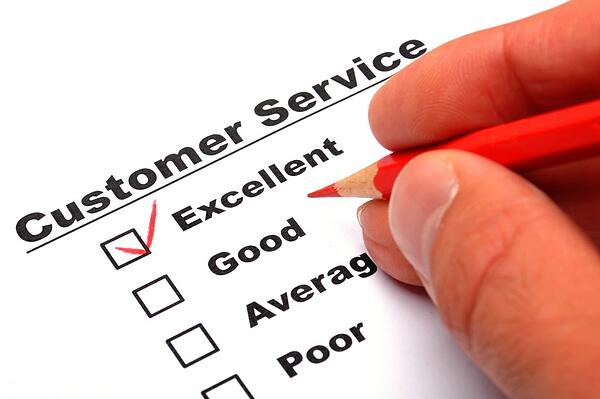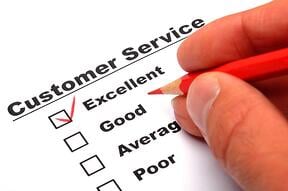CEO Blog - Advice for CEOs on growth and scaling
Customer Satisfaction Survey Questions: The Cardinal Rule to Know

 While working with an executive management team on customer satisfaction survey questions, they told me every survey seemed to have declining response rates. They asked me what I thought about just asking one question: “On a scale of zero to 10, how likely is it that you would recommend our company to your friends and colleagues?”
While working with an executive management team on customer satisfaction survey questions, they told me every survey seemed to have declining response rates. They asked me what I thought about just asking one question: “On a scale of zero to 10, how likely is it that you would recommend our company to your friends and colleagues?”
My response: Have you looked into the possible reasons why the customer survey response rates are declining? Too often I’ve seen companies want to ask the would-you- recommend-us question without doing enough follow-up to understand what it is they are doing right or wrong. This is where CEOs need to lead their companies and improve.
The Ultimate Customer Satisfaction Survey Question
The cardinal rule of customer satisfaction survey questions is a simple one: if you are not prepared to make changes based upon customer feedback, then do not do a customer satisfaction survey. Conducting customer satisfaction surveys contains two inherent dangers. The first is that you are asking your customers to remember annoyances, difficulties, problems, etc.—things that they don’t like about your company. Asking your survey questions can lower your customers’ sense of satisfaction.
This makes the second danger all the more critical: if you do not make changes based upon the feedback your customers provide, your message to them is that you do not really care about either their feedback or the difficulties they have experienced. Customer satisfaction surveys can have a negative impact on customer experience—and actually increase negative word-of-mouth.
So, “would you recommend us?” can be an incredibly useful question to ask customers—if you ask the follow-up questions to find out why or why not—and if the answers generate change. Otherwise, don’t ask. Sue Cyliax, in a recent blog post explains the concept of brand ambassadors.
The would-you-recommend-us survey question originates in the theory that willingness-to-recommend correlates to satisfaction and loyalty.
- Customers who are highly likely to recommend your company—scores of 9 and 10—are highly satisfied and are potential promoters of the company who generate positive word-of-mouth.
- Customers who give low scores—0 through 6—are somewhat to highly dissatisfied and are potential detractors of the company who negative word-of-mouth.
- Customers who give scores of 7 or 8 are passively satisfied. Although they are generally satisfied with the products and services they receive, they are not going to be detractors of the company. But their level of satisfaction is not so high that they would be promoters of the company either. They probably aren’t going to trash talk your company, but they aren't going to promote you either.
Your net promoter score is the difference in the percentage of customers who are promoters and the percentage who are detractors. [For example, if 20% of your customers are promoters and 50% of your customers are detractors, then your net promoter score is -30.] There is supposedly a close correlation between net promoter scores and a company’s revenue growth. Obviously, the higher the net promoter score, the more likely your buyers and customers are to generate positive word-of-mouth. See Barbara Fowler's recent article.
The Growing Impact of Word-of-Mouth Recommendations
The impact of word-of-mouth—positive or negative—has never been greater. The proliferation of mobile devices combined with the rise of social media is creating a world where your customers and potential customers are always online, always connected and always sharing their reactions and impressions.
Increasingly, your customers and potential customers are making up their minds about your company, products, and services based upon what is being said about you online. Your biggest hurdle may no longer be your competitors; it may be the ability of buyers to learn about you on their own from online reviews, posts, blogs, yelps, and tweets—making it increasingly difficult for you to control the message.
Therefore, managing the customer experience so that it generates positive word-of-mouth is increasingly important. The would-you-recommend-us question can give you some insight into how well you are doing that.
But never, ever ask that question on a customer satisfaction survey unless you are committed to making the changes that may be required.
Topics: Customer Intimacy, Consumer Insights, Customer Satisfaction
Sun, Dec 23, 2012- Press Releases
- Careers
- Case Studies
- Marketing Consultant Company
- Marketing Strategy Consultants
- Marketing Plan Consultants
- B2B Marketing Consultants
- Virtual CMO
- Marketing Consultant Outsourcing
- Fractional CMO
- What is a Fractional CMO
- Healthcare Marketing Consultant
- Marketing Consultant Houston TX Texas
- Marketing Consultant Texas TX
- Marketing Consultant Bay Area
- CEO Blog
- Ebooks Plus
- Executive Marketing Consultants
- Product Marketing Consultants
- B2C Marketing Consultants
- Virtual Marketing Consultants
- Senior Marketing Consultants
- Temporary CMO
- Hire a CMO
- Fractional CMO Salary
- Fractional CMO Responsibilities
- Marketing Consultant Austin TX Texas
- Marketing Consultant Dallas TX Texas
- Marketing Consultant San Antonio
- Helping Private Equity
- Private Equity Blog
- Leadership Team
- Privacy Policy
- Business Marketing Consultants
- Strategic Marketing Consultants
- Marketing Technology Consultants
- Sales and Marketing Consultants
- CMO Job Description
- CMO Salary
- Fractional CMO Agency
- Fractional CMO Services
- CPG Marketing Consultant
- Marketing Consultant San Diego
- Partners
Houston, TX 77056
© 2023 Chief Outsiders



